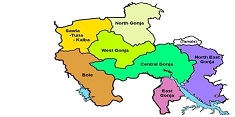Understanding the General Overview of Conflict Transformation and its Dynamics in the Savannah Region of Ghana

Abstract:
From
creation, conflict has since lived with mankind in all facets of life. Conflict
lives with man, his environment, groups or associations. In families or
marriages, conflict is deeply experienced either in the form of simple or
chronic. At the workplace or the institutional level, conflict plays a key role
in work operations among or between employees and employers or core management. Conflict in itself comes with positive
and negative development to society. In the sovereign country like Ghana,
majority of the population hold the perception or proposition that the five
regions of the North are deeply rooted into conflict engagements. This
perception is done to some geo-conflict occurrences in the Northern part of
Ghana. The question is - what really is the term conflict? Many have divergent
conceptualized views, opinions or perceptions about conflict in society. Some
find answers by saying it erupts when there is argument between two or more
people, when there are interests to satisfy, misunderstanding, cheating,
injustice among others. Even identical twins do have conflicts. Examples of
conflicts include the Kusasi –
Mamprusi conflict of Bawku, Konkomba – Dagomba conflict, the Abudu – Andani Dagbon
Chieftaincy conflict all of Northern Ghana and the Eritrean – Ethiopia Civil War, Rwandan Genocide,
Somali Civil War, Nigerian Civil War as well as the Russia – Ukraine War.
References:
[1] Weber,
M. (1968). On Charisma And Institution Building, 322, University of Chicago
Press.
[2] Conley
R. S. and Dahan C. (2013). Legislative Behaviour in the Northern Ireland
Assembly.
[3] Carter, M. S., & Little, M., (2007).
Justifying Knowledge, Justifying Methods, Taking Action: Epistemologies, Methodologies
and Methods in Qualitative Research. University of Sydney, Australia.
PMID:18000071.
[4] Dordah, A .D., (2012). Framework of
Integrating Indigenous and Formal Conflict. Resolution Approaches in the Upper
West Region of Ghana, theses.
[5] Payne, K., & Grey, L. (2014).
Quantitative Methodologies. In
an Introduction to Health Services Research Sage Publications Ltd.
[6] Benarkuu, G. G., (2015). Spider-web Methodology
of Gathering Data to Solve Conflicts in Society. EMODAL manual. CCOD (SUNYANI).
www.ccod.edu.gh
[7] Sears,
Alan., (2008). A Good Book in Theory: A Guide to Theoretical Thinking. New
York; Higher Education University, Toronto Press.19.
[8] Mahama,
E. S. (2003). Conflict in Ghana: Strategies, Stakeholders And the Way Forward.
In B.
[9] Marshall
J. E. (2009). Building an Effective African Standby Force to Promote African
Stability, Conflict Resolution and Prosperity [Discussion paper No. 16] (Series
2). London, UK: Crisis States Research Centre.
[10] Bates,
R. H. (2019). Modernization, Ethnic Competition, And the Rationality of
Politics in contemporary africa. in State versus Ethnic Claims: African Policy
Dilemmas (pp. 152-171). Routledge.
[11] Nnoli,
O. (2006). National Security in Africa: A Radical New Perspective. Enugu:
Snaap Press Ltd.
[12] Adjei,
J. K. (2016). “Tracking the Peacebuilding Approaches in the Bawku Chieftaincy
Conflict: Prospects and Challenges” in Steve Tonah and Alhassan Suleimana
Anamzoya eds.), Managing Chieftaincy and Ethnic Conflicts in Ghana (pp. 67-89).
Accra: Woeli.
[13] Roland,
D. (2010). International Relations Theories: Energy, Minerals and Conflict (working
paper n. 8).
[14] Burton,
J. (1990). Conflict: Resolution and prevention. Vol.1. London: Macmillan.
[15]
Michalopoulos, S., & Papaioannou, E.
(2020). Historical legacies and African development. Journal of Economic
Literature, 58(1), 53-128.
[16] Van
Halema, V., & Rassul, K. (2013). Local Conflict Trend Analysis: Balkh
Province. Kabul: CPAU.
[17] Kwesi,
A. (2013). Report on Access to Justice -Scoping Study of the Justice (formal
and informal) sector in Ghana. (Unpublished Manuscript).
[18] Atuguba,
R. A., Agyebeng, K., & Dedey, E. (2006). Access to justice in Ghana:
[19] Bukari
K. N. (2013). Exploring Indigenous Approaches to Conflict Resolution: The Case of
The Bawku Conflict in Ghana. Journal of Sociological Research, 4(2),
86-104.
[20] Hammill,
A., & Bescançon, C. (2010). Promoting Conflict Sensitivity in Transboundary
Protected Areas: A Role For Peace and Conflict Impact Assessments (Handbook
Dialogue Series, No. 8.). Paper Prepared for the Workshop on Transboundary Protected
Areas in the Governance Stream of the 5th World Parks Congress, Durban, South
Africa.
[21] Awedoba,
A. K. (2009). An Ethnographic Study of Northern Ghanaian Conflicts: Towards a Sustainable
Peace. Accra: Sub-Saharan Publishers.
[22] Lundy,
B. D. (2014). Monitoring Conflicts of Interest: Social Conflicts in Guinea
Bissau’s Fisheries. London: Lexington Books.
[23] Lederach,
J. (2005). The Moral Imagination: The Art and Soul of Building Peace. Oxford: Oxford
University Press.
[24]
Galtung, J. (1996). Peace by Peaceful Means:
Peace and Conflict, Development and Civilisation. Oslo, Norway: PRIO.

